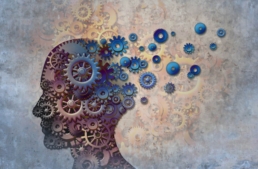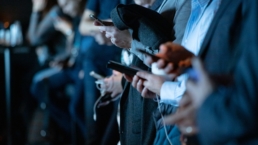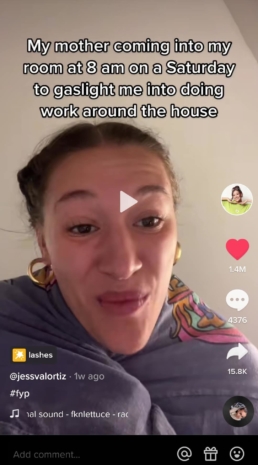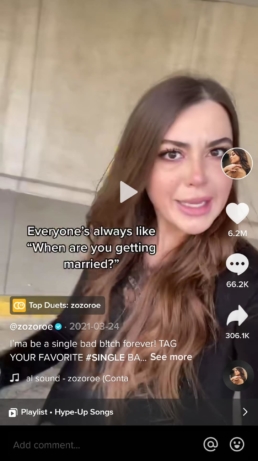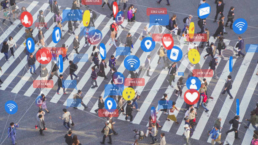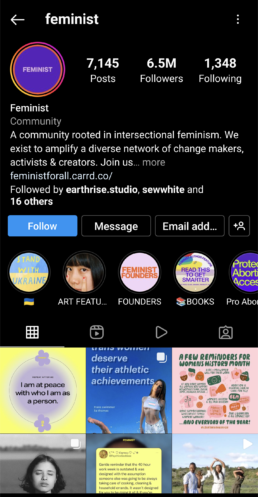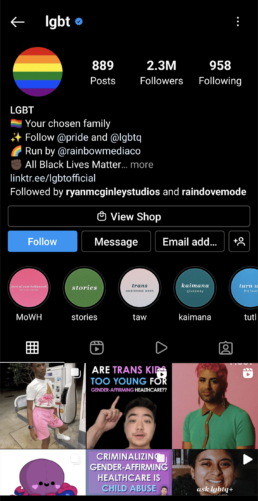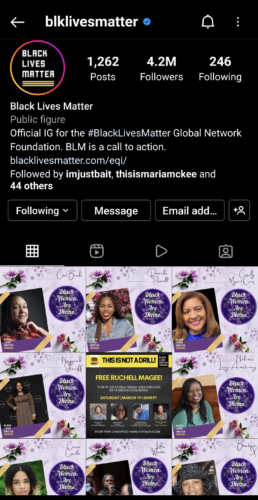The importance of pictures and social media
In this blog, our marketing assistant Ash, explains the value of images and social media.
In previous blogs, we discussed how social media can be harmful and have a negative impact on people’s self-perceptions and mental health; however, this time, let’s focus on the positives.
We are always told to ‘live in the moment’ but everyone’s life is greatly influenced by photos since they help us remember our past and remind us of specific people, locations, emotions, and events. They can help in defining who we are. One of the most popular responses when you ask people what items they would save if their house was on fire, is a photo album or PC containing all of their digital photos. Pictures tell our own stories and serve as a timeline of the people and places we value most in our life. They form our narrative, which we might later give to others. In the end, the countless photos we take combine to tell the story of our lives.
When I was in primary school, we had to take class photos where the teachers stood behind the children and the pupils sat or stood in ascending height order (tallest at the back, shortest at the front). Every kid would moan back then because they didn’t want to go through the hassle of fixing their uniforms, hair, etc. Nor did any of us want to stand or sit outside in the cold simply to take a picture, but little did any of us know that those class pictures would become one of our most treasured memories in the future. None of us knew that those pictures would probably outlive us. The school picture might turn up again a few generations later among old documents in an attic, and someone would look for their grandpa or auntie among those young faces. Whenever I find an old school photo of myself, I begin naming each student and teacher and instantly, words become memories.
Photographs are important because they capture brief moments in our life that, to us at the time, seem to have little meaning. The importance of a snapshot might not even be for us; rather, it might be for people who are looking for us or the places we once visited. Each photograph could be a tiny piece of a puzzle that puts our lives in perspective.
We can express ourselves through art by using photography. When we see a stunning scene or someone with angelic facial features , we want to capture it. Although we all have a different purpose in mind when taking a picture, we all want to produce something.
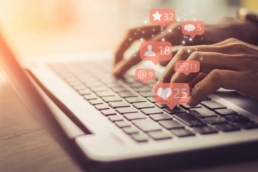

When you post a picture or a video to social media you are letting the world see a glimpse of what you get up to in your life. Every picture has a story behind it. You will be reminded of that particular occasion when you look at family photos because there is a story associated with each picture. You have the chance to talk about what you know and what you want to be recognised for on social media. Sharing your knowledge will help you meet new people and develop new relationships. You will have more and more possibilities to interact with like-minded people if you learn how to effectively communicate your professional experience, accomplishments, and outcomes. You can start to build up trust by sharing content on subjects that you are knowledgeable about. This applies to more than just your online appearance. Your ability to be trusted will be validated if you live your personal image and your activities match with your online identity. As a result, the relationships you develop will be more genuine and precious.
There are times when you get a new outfit or do a lovely makeup look and want to show it off, but you’re too scared to post any pictures out of fear that people will point out your flaws or notice things about you that you didn’t realise, etc. However, if you ever have a moment where you feel confident and attractive, don’t be afraid to flaunt it in front of the world. Trolls will constantly try to bring you down and make you feel unworthy, but keep in mind that good will always outdo the bad. There will be a lot more people who admire your confidence, think you’re gorgeous, and compliment you.
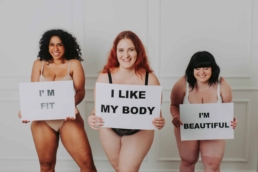
Six interesting facts about technology:
In this blog, our marketing assistant Ash, will share some rather interesting, yet random facts about technology:
We cannot dispute the fact that technology has taken centre stage in our lives. It all started in the Stone Age
- Stone Age implements were some of the earliest signs of technology. Technology is the application of knowledge to create new tools or devices. This indicates that the invention of cooking and carrying pots by people in the Stone ages is an example of technology. Technology has improved people’s lives throughout history.
Did you know, printer ink can be saved by changing fonts?
- Yes, fonts are not all created equal. According to the hypothesis, using a font with a “lighter” stroke will result in a minor reduction in the amount of ink used each page. By switching to one of the lighter fonts, you’ll probably save roughly 10% ink, assuming that you’re only printing with inkjet printers that utilise the standard cartridges (not ink tanks or laser printers that use toner as their printing medium).
Would you believe me if I told you that 92% of the world’s currency is electronic?
- This indicates that the majority of the money you make, deal with, spend on goods and services, and so forth, only exists on computers and hard drives. Physical money makes up only about 8% of cash worldwide. All of the black money hoards originate inside this 8%. Although not a precise number, this is a reasonable estimate that economists appear to agree on. Although this low percentage initially seems crazy, it actually makes sense when you consider that the majority of significant transactions are carried out electronically.
Let’s include a random fact for you-
- Initially, Apple planned to create an apple-shaped flip phone. Apple patented a phone design in the form of a real apple before the initial iPhone design.


Technology benefits us in our medical care-
- By releasing mosquitoes that had been altered to stop them from transmitting the virus, a scientist by the name of ‘Ali Utarini’ was able to reduce the number of cases of dengue fever, an illness brought on by specific mosquitos, by 77% in some areas of a sizeable Indonesian city. They used technology to inject bacterium into mosquito eggs, stopping dengue sickness by spreading the bacteria to other mosquitos. With the use of this technology, fewer people will become ill or even pass away from sickness, especially in developing countries in Asia, Africa, and South America.
Did you know that in 1936, Russia invented a machine that functioned on water?
- Before transistors were made smaller, computers employed a much more obvious counting system. Gears, pivots, beads, and levers were frequently used, and they required a power source to run. A computer powered by water created in 1936 by Russian scientist ‘Vladimir Lukyanov’ was the first of its kind in the world to be able to solve partial differential equations. The answers were indicated by the levels of interconnecting glass tubes filled with water, while changing the taps and plugs altered the variables. It had uses in a number of disciplines, including metallurgy, rocket engineering, and geology.
Stay tuned for more interesting, yet random facts on technology.


What do the young adults of today think of social media?
Our marketing assistant, Ash, interviews young adults about their own perspectives on social media.
Six questions were posed to them:
– Which social networking outlet is your favourite?
– Why?
– How important are followers/likes to you?
– Why do you think that is?
– Do you believe that social media has been more positive or bad in recent years?
– Why do you think that?
Some people wished to stay anonymous. Here is what they had to say:

Name: Anonymous
Age: 21 years old
“My favourite social media platform is probably Snapchat because it’s one of the first social media accounts I made, it’s the one I use the most to talk to my friends and it’s easy to use. Followers and likes did use to matter to me a lot because I was very insecure when I was growing up, so followers and likes to me, meant that I was getting ‘approval’ from others. However, now, I don’t care so much about that because the following and like count shouldn’t matter, it’s not real life and half the time most of people’s followers are people they’ve never even met before. Someone’s self worth and confidence shouldn’t be based off followers and likes. I think social media has become a lot more negative because of cyberbullying and trolling and it can make a lot of young people insecure. People edit their photos to show the ‘best version’ of themselves and young children can look at that and think ‘this is how those people look all the time’, when it reality, it’s not. Social media has added more pressure on people to be ‘perfect’ and shows unrealistic images of people living ‘perfect’, ‘amazing’ lives, in my opinion, this can make a lot of people (young or old) look at those pictures and feel like they aren’t achieving anything and are also behind on life. Social media has helped me connect with friends but it’s also made me feel isolated when I see my friends hanging out on days I can’t join, it’s also affected my self image in a more negative way, as I’ve become a little more insecure.”
Name: Alfie
Age: 19 years old
“I’d say my favourite platform is Snapchat because it’s not as ‘competitive’ like how instagram is. Most people try and ‘show off’ on instagram. Followers use to matter to me but I’ve kinda just stopped caring over time, like I just don’t care anymore. I don’t think that ALL social media’s are bad but some are way worse than others…”
Name: Ashlynn
Age: 18 years old
“My favourite platform at the moment is Snapchat because it’s a good platform to message my friends and it’s not crazy addictive. I try to act like the ‘like count’ doesn’t matter to me, but it actually does, if I post something and it doesn’t get as many likes as my previous posts usually do, I’ll start to think people hate me. Social media has become growingly negative as I’ve grown up. I initially downloaded social media platforms to post fun things, but now it’s a ‘like/follow/comment’ contest and I don’t like that, it’s super easy to be insta or TikTok famous nowadays, there is no benefit in that and it kind of (I don’t know how to properly phrase this) but discredits actual celebrities. These influencers just mess about and don’t seem to contribute a lot. It’s weird seeing them at these big red carpet events. In my opinion, this can cause negativity because seeing how easy it is to get famous, can cause children to believe they should or will be famous and it can cause them to do mental and physical damage to themselves in order to get there (eat less, self-image issues etc). I’d say social media has affected me personally, in both a positive and negative way because it has allowed me to expand myself and meet new people, but sometimes I get anxious or stressed when I see people who have bullied me on my timeline or people that I’m gender envious of or if I see people more attractive than me.”
Name: Erin
Age: 19 years old
“My favourite social media platform is probably Facebook just because my feed is mainly the older generation complaining and I find it amusing/entertaining. Followers and likes don’t really matter to me- I post for myself not for other people but just like many other people on Instagram, it’s a confidence boost when you get more than just your friends liking pictures. Social media has become more positive in recent years with body positivity and more awareness on mental health but it still has its negatives with reducing face to face communication and cyberbullying.”
Name: Peter
Age: 19 years old
“I’d say Snapchat id my favourite, mainly due to it being the preferred social media platform for closest friends and it’s where I talk to mine mainly. I have a mixed opinion on followers/likes mattering to me, as on one side, my desired career path can be massively helped by getting my name out there through social media, therefore interactions in that scene, can help. But when it comes to just me as a person, I don’t mind if I have 1K likes or even just 10 on a post. I’d say that social media is both (somewhat) equally positive and negative. One positive, is to be able to interact with people all over the country/globe. I’ve met loads of people who have drastically improved my life through social media. However, social media can also be extremely negative, as it becomes very easy for someone to constantly compare themselves to celebrities or people they look up too etc, causing insecurities to build up and negatively affect their mental health. I’d say significantly, social media has affected me in a more positive way, mainly because of the people I’ve met through social media.”
Name: Anonymous
Age: 23 years old
“My favourite is Facebook as I can talk to my family abroad. I don’t care about likes or followers because I don’t care about other peoples opinions on my looks/personal interests. I personally think social media has become negative, due to the growth of social media, there’s bee way more cyberbullying and there’s general pressure on the younger audience ‘to fit in’ and it feeds them fake standards and false sense of reality, I have experienced both negative and positive with social media. Negative: as it does get to me mentally when I see women my age looking ‘flawless’, I seem to compare myself and that takes a toll on me, although I said I didn’t care about peoples opinions on my looks, I do have days where I think “She’s doing so well in life and I’m here”, basically I compare my life, I think I’m behind/stuck, I have also been bullied online, which is something you can’t run away from because unfortunately, it’s everywhere, but the positive side is that I am able to contact friend and family and even meet new friends.“
Name: Anonymous
Age: 19 years old
“My favourite social media platform is TikTok because I feel like it’s more of a fun and safe place compared to other platforms (for example Instagram and Twitter). I feel like from my own experience, there is less toxicity on TikTok than on Twitter. Followers and likes used to matter to me a lot but I’ve kinda learnt to not care anymore. However if you work hard on something and post it and it doesn’t do well, I feel like it’s very discouraging. I used to care about followings and likes because I felt like it gave me validation and I was comparing myself to other influencers. I think social media has become positive and negative. Negative because, there’s a lot of bullying, on Twitter a lot of bullying happens and drama, it’s a very toxic environment. But on the other hand, social media can be good to meet others that have same interests, to share your passions, and create an audience that can lead to a potential business or career. I have a personal Instagram and one dedicated to books, I feel like that has affected me in a good way because I get to share my passion for books and become apart of a community. However, there are times where I do need a break due to mental health but I wouldn’t say it’s really a full negative for me.”
Name: Rafael
Age: 19 years old
“My favourite platform is Instagram because it has a greater variety of entertainment for anyone. Followers do not matter to me at all because I don’t see the point of caring about how many people I follow or follow me back. Social media has been leaning on the bad side of things for quite a while, with a lot of hate that is found everywhere you look but it does have some positives sides such as teaching people things or being able to get something important across. I mean, personally I use social media to look at things I like such as skateboarding and fashion but I also use it for fund-raising.”
To sum up, it’s fascinating to see so many similar but diverse viewpoints on social media. Many people discuss their own personal experiences with social media and how it has influenced them in both positive and negative ways. I discussed, in more detail, the beneficial and negative effects of social media in a previous blog (‘The chains and shackles of social media’). I appreciate everyone who contributed to this blog. I think we all need to remember that social media can be fake; most pictures you see are edited, and most articles you read are embellished; not everything you see or read online is real; and it can be difficult to find someone who can relate to you on some level. I write these blogs to show young adults, teenagers, and children, they are not alone and that many people can relate to them, but I also want to encourage them to be themselves and to not feel compelled to change themselves for the approval of others.
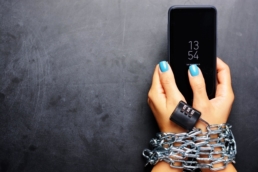
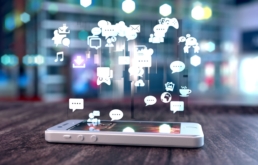
Why is TikTok so popular?
Here, our marketing assistant, Ash, discusses the world’s fastest growing app, TikTok:
With over 2.6 billion downloads as of December 2020, the app had more than 1 billion monthly active users globally by the end of 2021 (Statista) making it the 7th most used social media app in the world. This number grew to 1.4 billion by the end of Q1 2022 (CNBC), so the app’s popularity shows no sign of slowing down.
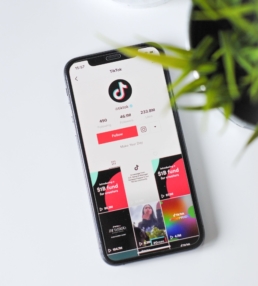
The ‘for you page’
The social media platform will give content that is unrelated to the user’s preferences in their “For You” page. This tool is meant to increase diversity by introducing users to new content creators and categories, as well as new ideas and perspectives. This algorithm can also remember which videos you might have liked, commented or lingered on and suggests new videos based on that information.
Other platforms, such as Facebook, Instagram, and YouTube, could be claimed to have not fully addressed the issue of content suggestion diversity. These large social media platforms’ algorithms spotlight more of the same type of information that users previously loved, trapping them in a cycle of similar content and not allowing them to explore further.
The trends
Another key reason for TikTok’s success is the prevalence of trends, such as dance challenges for popular songs or videos with trending in-app filters. The algorithm gives preference to videos that corresponds to current internet trends and because popular trends attract greater attention, other users are more likely to join in and generate material too. This system encourages songs, challenges or filters to snowball in popularity and cultivates virality in a way other social media apps don’t.
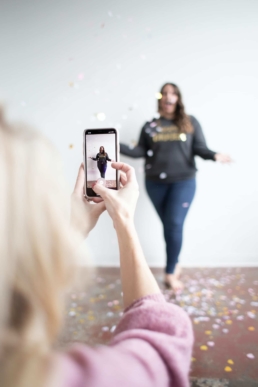
Video sharing
The TikTok app has taken video making and sharing to the next level by simplifying it. All users have to do is record and publish anything from their regular activities. Because of the brief format, neither creating the video nor watching it takes much time or effort.
Additionally, when a user starts the app, this short-form video material is automatically played. One by one, the clips begin to play, and the spectator becomes drawn to a sea of amusing, addictive video content. The sheer volume of content means it’s not uncommon to loose track of time while watching. Coupled with the short video durations (most clips are between 10 seconds and 10 minutes long) and the constantly refreshing feed, this can quickly become addictive!
TikTok’s future
Where to next for TikTok? Despite it’s meteoric growth, TikTok will have to continue to innovate and find new ways to engage its users in order to sustain it’s current popularity. We’re also interested to see how they attempt to court more brands to start building a presence on the App. A few brands have seen success with their videos on the platform (Duolingo and Innocent smoothies are noteable accounts) but not every business will be able to embrace the casual jokes and authentic tone of voice viewers favour on this platform.
How far has technology progressed?
Our marketing assistant Ash talks about how advanced technology is getting, and how technology has helped/affected us.
Thanks to technology, it is now easier to do even the simplest of daily tasks. A variety of devices and technology are available to make people’s life easier. It has also had an impact on today’s culture in areas including transport, schooling, employment and healthcare. However, because technology is evolving rapidly, we are seeing what some people think to be troubling developments for the future, particularly in employment.

Employment and robots
Technology, in the form of robots, appears to be taking over more and more. For some people this is terrifying. It has been said that robots will replace up to 20 million factory jobs by 2030, 30% of jobs will be replaced by robots even the ones that are tedious and according to the Office for National Statistics, In England 1.5 million people are at risk of losing their employment to robots. Restaurants are now using robots to allow people to order independently without having to talk to a waiter/waitress. There are also food delivery robots called ‘Starship’, which take away the need for delivery drivers.
Sophia, the ‘human robot’
Most robots that have been created over the years are so lifelike, which has led to many people telling the creators of these robots, to ‘shut them down’, and to ‘never bring them back’. One of these robots is named ‘Sophia’.
Many people were impressed when Sophia was first announced to the world back in 2016. Sophia was created by a Hong-Kong based company called ‘Hanson Robotics’. Being the first well-known robot to touch both our intelligence and our feelings at the same time, Sophia gained many fans and popularity. She communicates in a delicate, educated, sympathetic, expressive tone and can make many facial expressions. Unlike Ameca, another human-like robot (yes, there are two), Sophia was made to look human. She is also capable of answering basic questions and holding simple discussions. Sophia’s eyes have cameras placed in them, and she can see objects thanks to computer algorithms. The humanoid robot can track faces, maintain eye contact, and recognise individuals.
It’s no surprise that many people are concerned about how advanced technology is becoming. Many people have made conspiracies about robots, specifically Sophia the robot, saying things like “Robots will take over the world” or “Sophia will forget she’s a robot one day and run for president,” and personally, I agree with some of these statements to an extent. No, I don’t believe Sophia will run for president, but I do believe that technology will only get more intelligent and powerful. Most devices that have been designed and made, are very helpful and even life-changing, but do we really need not one but TWO lifelike robots?
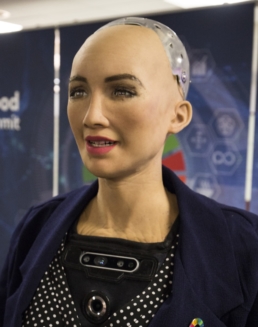
Healthcare
Throughout the centuries that we have been practicing medicine, only fairly recently many revolutionary breakthroughs in healthcare technology have been achieved.
Technology solutions are assisting healthcare professionals in improving performance. These solutions are assisting clinical staff in improving patient care, creating better experiences, and reducing stress as hospitals and health systems accept value-based health reimbursement systems. It is now routine practice to use EHR systems or other technologies when communicating with patients and developing treatment regimens. Laptops and tablets have become as widespread in healthcare settings as medical instruments, and there’s strong evidence that electronic health records (EHRs) are improving access to and sharing of health data.
Many previously unthinkable medical therapies are now possible. Patients can now obtain MRI scans, X-rays, and a variety of other medical procedures to figure out what’s wrong with them – this ability is saving and changing lives every day.
Education
Self-paced learning is one of many significant benefits that students have gained because of the advancement of technology in the education sector. While some people are quick learners who can adjust rapidly, others need a long time to grasp a concept. Such pupils are fortunate to have the internet as part of their education; they can now easily keep up with their peers thanks to a thorough comprehension of produced courses and an online curriculum tailored just for them.
Technology has made things a lot more enjoyable than before. Pupils are involved in a variety of learning activities that help them remember new information. There has been a vast array of educational applications since the emergence of computers, tablets, and mobile phones, allowing learners to study numerous ideas in a fun way. They can also watch live streaming videos online to better comprehend a topic, theory, or issue.
Has technology gone too far?
Finally, many individuals are conflicted about how technology is progressing. Many people feel that generation Z (my generation) would be the last to remember life before social media and technology became so widespread and advanced. Personally, I believe that some aspects of technology are beneficial, such as assisting the NHS. However, I believe that, with all this new technology being developed, things will eventually get out of hand.
Although it takes a lot of effort and patience to create an outstanding robot, like Sophia, I personally don’t understand why we need such a lifelike robot. Many robots are helpful, but when they begin to take over people’s jobs and therefore livelihood, it becomes a concern. Many people are losing their jobs to robots in places like supermarkets and restaurants. Furthermore, it could be argued that robots within the workplace can be a health and safety issue. Why? – what if something malfunctions? What will happen? Society has become reliant on technology, even for mundane tasks such as cleaning, resulting in many people being unmotivated to accomplish anything on their own.
Enjoy technology but also remember to enjoy real life too, go outside and live in the moment.
The chains and shackles of social media
Our Marketing Assistant, Ash (18), reflects on what it is like to have grown up in the social media boom, and how it has both enhanced the lives of young people and had devastating effects on their mental health.
As the popularity of social media grows amongst the younger generation, it is no wonder why teenagers have become more and more insecure. According to the most recent social media statics, there were 3.78 billion social media users nationwide in 2021, many of which are impressionable teens. Most of our previous offline social interactions have been replaced using social media. Even when we’re out with friends, we feel tempted to check social media on a regular basis.
Furthermore, many children between the ages of 5-10 are being given electronic devices, such as smartphones, forgoing traditional play and outside activities. As a result, more children are installing apps with a 13+ age limit (such as TikTok) and are exposed to different ranges of content. Lots of the content on these apps may be potentially harmful and/or rated 18+. This could lead to children being influenced to do things that are harmful to themselves and others. They might participate in harmful pranks, post embarrassing content, or cyberbully others without understanding the gravity of what they are doing.
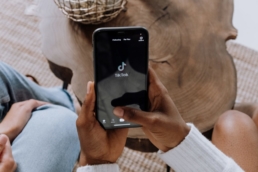
Mental health
Many young teens have low sense of self-worth or a negative body image to start with, but seeing idealised, unattainable body types plastered over their social feed is surely only going to make this worse. Even if you’re aware that the pictures you’re seeing on social media have been modified, they can still make you feel insecure about your appearance.
When teenagers and young adults see influencers/celebrities that they admire and look up to, they tend to imitate some of their habits, fashion trends, and other aspects of their personalities. While this may not seem to be a bad thing, some teenagers and young adults lose sight of who they are and are unable to develop their own opinions and personas. Most celebrities/influencers (such as Kim Kardashian) edit their pictures before sharing them online – many teenagers may start mistaking fake for reality.
Moreover, to be mentally healthy, people require face-to-face contact. You’re more likely to develop mood disorders like anxiety and depression if you prioritise social media over in-person relationships. Multiple studies have said that heavy social media usage can increase risk of depression, anxiety, loneliness, self-harm, and even suicidal behaviour. Suicide is one of the most common causes of death among children under the age of 14.
Cyberbullying
Cyberbullying is not a new topic, but the growth of social media has pushed it to greater levels. A few statistics from StopBullying.gov show:
Up to 43% of teenagers have been bullied online. At school and online, nine out of ten LGBTQ+ students have been harassed, 58% of teens haven’t told their parents or an adult about something hurtful or mean they encountered online, around 10% of teenagers say they’ve been bullied on social media, and many others have experienced vile comments. Instagram and other social media platforms can be major sources for spreading damaging rumours, lies, and abuse that can lead to bigger and scarier issues (for example stalking).

Raising awareness
However, we can’t forget that social media has also been used to raise awareness on important topics.
The #metoo movement, #Lovewins, and #BLM have all benefited from the use of social media. Many people have come forward to talk about their prejudice experiences. Social media has become a main outlet for people’s facts and information.
#BLM; The Black Lives Matter movement began as an online community dedicated to combating anti-black racism and police violence against African Americans in particular. The online community was able to organise, mobilise, and raise its visibility using the hashtag and social media platforms, eventually growing into a group with over 40 chapters working to support black lives. Using social media and tools like hashtags, promoted information, raised awareness, and gave the BLM community a place to form and organise online.
#Metoo; The ‘Me Too’ movement started in 2006 but gained traction in 2017 when a few high-profile actresses spoke out about their sexual harassment experiences in the film industry online and used the hashtag #MeToo to do so. The topic’s popularity sparked a greater awareness of the ‘Me Too’ movement, sexual harassment, and assault with the hopes of reducing tolerance for abusive behaviour and increasing support for victims.
#Lovewins; Many people across many platforms applauded the Supreme Court’s decision in 2015 to legalise marriage between same-sex couples. With the courthouse victory, the HRC’s #LoveWins movement was pushed into full swing on social media, encouraging people to share thoughts and pictures in celebration of the victory by using the #LoveWins hashtag. Now there are profiles on all social media platforms, promoting LGBT+ rights.
Social media as a job
Social media has helped many people when it comes to careers. Influencers, such as Nikkie Tutorials, use YouTube and other social media platforms, as a source of income. Nikkie Tutorials is a Dutch makeup artist and beauty YouTuber. Her YouTube video “The Power of Makeup” went viral in 2015, which lead to dozens of new similar videos of people showing off their faces with and without makeup, she now has 13.9 million YouTube subscribers and uses her platform to promote make-up positivity. She also went on to host the Eurovision Song Contest in 2021 and collaborate with big artists including Adele. Nikkie came out as transgender in her ‘I’m coming out’ video back January 2020 and has since encouraged many individuals (young and old) to be themselves. She made appearances on ‘The Ellen Show’ to discuss her experiences before and after coming out as transgender.
TikTok (formerly known as Musical.ly) has grown in popularity. Many lives have been changed as a result of it, and many people have achieved long-held goals. Many TikTok stars (such as Vinnie Hacker) have been able to showcase their talents and have gone on to perform music, appear in films, model, and create YouTube videos, among other things.
Final thoughts
I am 18, and my experience with social media has been both positive and negative. I’ve experienced cyberbullying, I’ve seen disturbing videos that have been posted and shared across social media, I’ve seen my own friends and family compare themselves to other people, I’ve come across people who faked their true identity but I will admit, I have also met so many kind hearted people (who are now my close friends) through social media.
Yes, sometimes social media can be a source of joy when I am struggling mentally, it can make many people feel less alone (myself included), but you just need to be aware of the potential dangers. Sometimes I feel empowered by the things I see on social media, but most of the time, I tear myself down whenever I see the beauty standards of today.
Overall, we can’t stop social media from continuing to grow, whether we like it or not. Everything has a positive and negative side, and we can all agree that technology and social media have both. My advice is to use social media for entertainment purposes only, instead of allowing it to consume your life, remember that most things you see and read aren’t always true, find out for yourself using reliable sources rather than just TikTok. I understand that some people’s careers are on social media and technology can change people’s lives for the better, but even so, most influencers have stated that they gradually lost interest in making videos because of how toxic social media has become and they started seeing it as a chore rather than something they like, take Jenna Marbles, a former YouTuber (that most people know and love) as an example. Encourage the next generation to go outside and spend time with their friends and family, use social media to spread positivity, stay safe and use it to your advantage, don’t abuse it.


